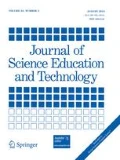Abstract
GLOBE is a global educational program for elementary and high school levels, and its main purpose in Costa Rica is to develop scientific thinking and interest for science in high school students through hydrology research projects that allow them to relate science with environmental issues in their communities. Youth between 12 and 17 years old from public schools participate in science clubs outside of their regular school schedule. A comparison study was performed between different groups, in order to assess GLOBE’s applicability as a learning science atmosphere and the motivation and interest it generates in students toward science. Internationally applied scales were used as tools for measuring such indicators, adapted to the Costa Rican context. The results provide evidence statistically significant that the students perceive the GLOBE atmosphere as an enriched environment for science learning in comparison with the traditional science class. Moreover, students feel more confident, motivated and interested in science than their peers who do not participate in the project. However, the results were not statistically significant in this last respect.
Similar content being viewed by others
References
Abd-El-Khalick F, Lederman NG, Bell RL, Schwartz RS (2001) Views of nature of science questionnaire (VNOS): toward valid and meaningful assessment of learners’ conceptions of nature of science. Proceedings of the annual meeting of association for the education of teacher in science.Costa Mesa (ERIC document reproduction service no. ED453083)
Allchin D (2011) Evaluating knowledge of the nature of (whole) science. Sci Edu 95(3):518–542
Enger SK, Yager RE (2001) Asessing student understanding in science: a standard based K-12 handbook. Corwin Press, Thousand Oaks
Markus H, Nurius P (1986) Possible selves. Am Psychol 41:954–969
Markus H, Wurf E (1987) The dynamic self-concept: a social psychological perspective. Ann Rev Psychol 38(1):299
Penuel WR, Means BM (2004) Implementation variation and fidelity in an inquiry science program: analysis of GLOBE data reporting patterns. J Res Sci Teach 41(3):294–315
Roschelle JM, Pea RD, Hoadley CM, Gordin DN, Means BM (2000) Changing how and what children learn in school with computer-based technologies. Future Child 10(2):76–101
Stake JE, Mares KR (2001) Science enrichment programs for gifted high school girls and boys: predictors of program impact on science confidence and motivation. J Res Sci Teach 38(10):1065–1088. doi:10.1002/tea.10001
Stake JE, Mares KR (2005) Evaluating the impact of science-enrichment programs on adolescents’ science motivation and confidence: the splashdown effect. J Res Sci Teach 42(4):359–375. doi:10.1002/tea.20052
Unemori P, Omoregie H, Markus H (2004) Self-portraits: possible selves in European–American, Chilean, Japanese and Japanese–American cultural contexts. Self Identity 3(4):321–338. doi:10.1080/13576500444000100
Wang J, Lin S (2009) Evaluating elementary and secondary school science learning environments in Taiwan. Int J Sci Edu 31(7):853–872. doi:10.1080/09500690701636361
Conflict of interest
The authors declare that they have no conflict of interest.
Ethical standards
All persons gave their informed consent prior to their inclusion in the study. The manuscript does not contain clinical studies or patient data.
Author information
Authors and Affiliations
Corresponding author
Rights and permissions
About this article
Cite this article
Castro Rojas, M.D., Zuñiga, A.L.A. & Ugalde, E.F. The Costa Rica GLOBE (Global Learning and Observations to Benefit the Environment) Project as a Learning Science Environment. J Sci Educ Technol 24, 721–734 (2015). https://doi.org/10.1007/s10956-015-9547-7
Published:
Issue Date:
DOI: https://doi.org/10.1007/s10956-015-9547-7




